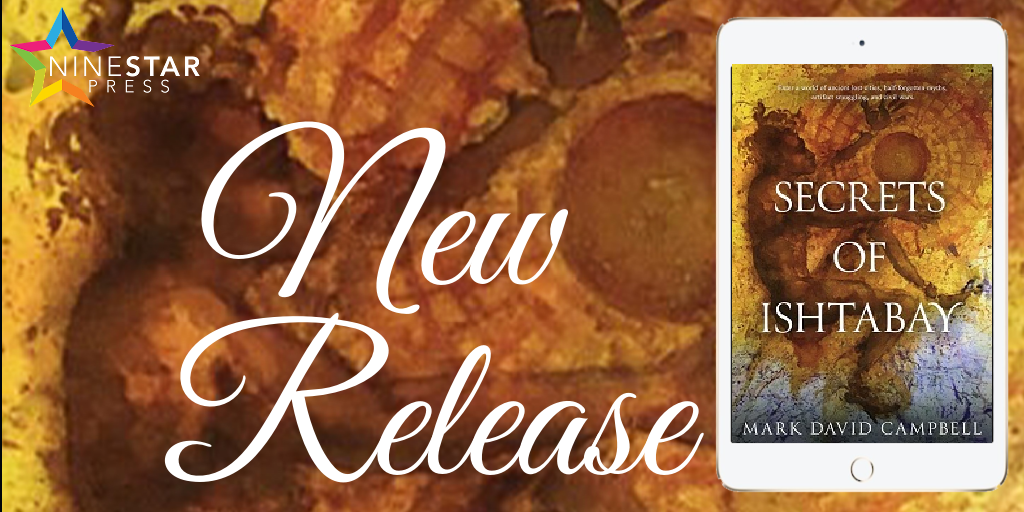Title: Secrets of Ishtabay
Author: Mark David Campbell
Publisher: NineStar Press
Release Date: 02/21/2023
Heat Level: 3 – Some Sex
Pairing: Male/Male
Length: 84700
Genre: Historical, historical, anthropologist, gay. murder, Mayan, Belize, secrets
Add to Goodreads

Description
In the western jungle of Belize, in 1962, Father Carl, an American missionary priest was found lying dead on the floor of his study. People from the nearby Maya village of San José were blamed but, strangely, no one was ever officially charged or found guilty. This is only one secret within a carefully guarded web of desire, envy, and guilt which torment and isolate people in this village.
Thirty years later, with the introduction of water and electricity, satellite TV, and the completion of the Western Paved Road, the village is connected to the outside world: people collide and their secrets unravel, sometimes tragically.
Secrets of Ishtabay takes you into a world of mysticism and antiquity and introduces you to a people who are suspended between an eroding past of ancient lost cities, half-forgotten myths, and subsistence farming, and a hostile present with encroaching global economics, illicit drugs, artifact smuggling, and civil wars.

Secrets of Ishtabay
Mark David Campbell © 2023
All Rights Reserved
Elio’s baggy blue boxers clung to his body, damp and sticky, even though he had just showered. It was already September, almost the end of the little dry season, and the rains and cooler temperatures had not come yet. Elio’s wife was seated on the sofa watching a comedy show on TV. A pole fan waved warm air from the television back and forth across the room.
Elio didn’t like comedies much. He didn’t get the jokes and he didn’t understand why people thought it was so funny when gringos acted foolishly.
Unlike most of the men and boys in the village, he didn’t follow the WWF wrestling championships either. As a young man he had liked the Mexican wrestlers. For Elio, those were real athletes, but these American wrestlers were like cartoon characters. They were too loud, too vulgar and he didn’t know any of their names. Instead, Elio preferred nature shows and documentaries. He was enthralled by the way television brought pictures of other lands, volcanoes, sharks, and people into his living room. After a good documentary he felt as if he knew more about the world beyond his village; a world that the gringos knew so well.
He also followed the TV news reports each day, even though they made him angry.
“Why do you get so upset over politics?” his wife would implore. “You can’t change things.”
But he wanted to change things, he wanted to tell the gringos that they were making things worse, not better, in Guatemala, Salvador, and Honduras. Now that Belize was no longer a British colony and the British troops were pulling out, he worried that the American-backed Guatemalan army might come pouring over the border which was only a few kilometers away.
Elio exhaled loudly but his wife took no notice, so with his book in hand, he retreated to the veranda on the front of his house, as he did most evenings.
He lowered himself into his hammock strung between the concrete posts of the veranda and gave a slight push with his foot. A gentle breeze blew up from the river. Elio sighed with relief and looked out toward the village. Where were the other men who used to sit on their verandas after dinner and listen to the radio? Where were the young people who used to wander lazily up and down the streets? Fewer and fewer people came out in the evenings the way they once did. Now, everyone was inside watching television and the streets were nearly dead.
He gave another push with his foot and leafed through his book. An American archaeologist working in the area had sent it to him last spring; the National Geographic’s Mysterious Maya. Humidity had already bloated its binding and the glossy colored pages were becoming increasingly wavy and sticky.
He turned to a page with a diagram comparing timelines of ancient civilizations and followed the Maya timeline across the page with his finger. Before the ancient Greeks had constructed the Parthenon and Alexander the Great had carved his way through Asia Minor and Persia, the seeds of civilization in the Maya lowlands had been planted. While the Roman Empire was being sacked by the Visigoths, Maya cities were flourishing. But prior to the Sung dynasty in China and the invasion of England by the Normans, civilization in the Maya lowlands had collapsed. After more than two thousand years the temples, pyramids, ball courts were all abandoned to the jungle; the people deserted their decadent rulers with their ostentatious ceremonies, returned to a simpler way of life in the bush, and forgot their rituals and deities.
He turned the page to an aerial photo of the ancient Maya city of Tikal, in Guatemala. It looked exotic and strange, even though he had been to the site hundreds of times and knew every structure there. He wondered if the main temple at his archaeological site of Baktunich, where he had worked as the official caretaker for the past twenty years, would also look as strange to him if they were pictured from the air and printed in a glossy colored book.
Turning a few more pages, he gazed at the hieroglyphs and figures painted on polychrome pots of ancient rulers sitting cross-legged on their platform thrones. Even if these lords of the jungle had flattened, sloped foreheads and wore big jade earplugs and feather plumes, they were somehow familiar, all the same. Their almond eyes looked like the eyes of the people he knew and their hair looked like the long hair of the river boys when they tied it to bathe. Even their noses were more or less the same shape as his own.
A mosquito landed on Elio’s belly. He glanced down, swatted it away, and scratched himself. Looking back at the picture of the Maya lords, he smiled. Their bellies and chests were like his and most of the older men in the village, or at least the fat ones, the ones with mothers and wives who looked after them. He breathed in thoughtfully, laid his book open across his stomach and gazed out across the plaza.
Coming from the far end of the village, Elio heard the mournful squawk of one of the local Protestant preachers on a loudspeaker singing over top of his congregation. During the weekday evenings the Protestants were all crowded into Bible halls. He chuckled. “While the Catholics are home making babies the Protestants are out singing to forget that the Catholics are making babies.”
He wasn’t sure whether he had said that out loud or whether he had only thought it. For some time now, during the long quiet days as caretaker of the ruins, he was in the habit of talking to himself to keep himself company.
“Oh well, if anyone hears me, they’ll say that crazy old fool is losing his mind. Huh, I probably am. Besides, everyone is either at a Bible meeting or sitting in front of the television. I’m the only one who sits out at night anymore.”
Elio let out a sigh and looked across the village at the odd collection of little houses and yards. People had more money and things now than they had ever had, but they were still poor. Sure, the village had known times when there wasn’t enough to eat; poverty came and went, but poor seemed to hang on like a dull drone that was not quite audible yet always there in the background.
“When did we become poor? It must have happened about the time we wanted to be Mestizo, no one wanted to be Maya Indian anymore. We have forgotten our past.” Elio placed his feet flat on the floor and stopped the hammock swinging. “We need an anthropologist to write down all our old stories before they are lost. We need to remember our history and who we are. Mestizo, huh.” Elio snorted. “Where did the European blood come from? We are Maya Indians.”
He opened his eyes wide, straining to see the hills and acropolis on the other side of the river. The top of the great pyramid, which poked beyond the canopy of giant ceiba trees, was cloaked in darkness, but he knew Baktunich, the Stone Maiden, was there as it had always been and perhaps always would be. He thought about when he was a young boy and would ask his father to tell him the story of Baktunich.
Purchase
NineStar Press | Books2Read
Amazon
Mark David Campbell is a Canadian Italian who has lived in Italy for the past twenty years where he teaches, writes, and paints, moving between lago Maggiore and Milan with his husband. Prior to this, he spent more than fifteen years working in archaeology and anthropology in Belize and has a PhD in anthropology from the University of Toronto. He enjoys pizza, beer, swimming, and salsa. Find Mark on Facebook.
One lucky winner will receive a $50.00 NineStar Press Gift Code!






